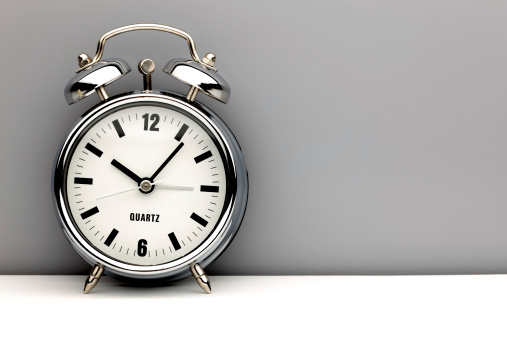

This post is in partnership with The Muse. The article below was originally published on The Muse.
It was 7:18 PM, and the clock was ticking. I had only 42 minutes to finish answering emails, wrap up a project I’d been working on all day, and make some revisions to an article.
With so little time, I didn’t glance at my phone. I didn’t browse Anthropologie’s online sale. I didn’t wander into the kitchen for a snack. Instead, I blasted through my inbox, turned immediately to the project, and then whipped the article into shape.
By 7:53 PM, I was done.
My deadline didn’t come from my boss or any of my (eight) editors. I’d set it myself, completely arbitrarily. This may seem kind of strange; after all, I was working like a mad woman when I could’ve taken my time. Nothing would have happened if I’d finished at 8:15 PM, or 9 PM, or even 11 PM.
However, I think self-imposed deadlines are one of the best changes I’ve ever made to my work life.
First, they force me to be much, much more efficient. When I’m pressed for time, I’m not tempted by any of the usual small distractions. Although it might only take two or three minutes to scroll through Twitter or read a short news blurb, the impact on my work is significant: Just a three-second interruption doubles the likelihood you’ll make mistakes.
Second, they make me a smarter worker. Not only am I automatically better at prioritizing, I don’t let wanting to get things done perfectly stop me from just getting things done. For example, when I’m on a deadline writing, I’m able to write the piece in one go, ignoring the imperfections, then go back and make changes.
Third, they make me less stressed. It’s counterintuitive that working on deadline would make me more relaxed, but let me explain. No matter what’s not done, I’m turning off my computer at 8 PM. Rather than looking at a long list of tasks and knowing I’ll be working until they’re all finished (which often is a trigger for procrastination), I look at my workload with the knowledge I’ll be finished in a specific number of hours. It relieves a lot of anxiety.
Convinced yet?
I know that it can be hard to stick to self-imposed deadlines because, well, there aren’t immediate consequences if you don’t meet them. But here are a few tips that have worked for me:
Write Your Deadlines in Your Planner
Putting them in your calendar (right next to “meet with Jody to discuss report” and “finish taxes”) will help you treat your deadlines just like your regular tasks: real.
Schedule Something Right After Your Deadline
If you give yourself a 7 PM deadline, make dinner plans with a friend for 8 PM. Not only will this inject some immediacy into your work, but you’ll also have a reward for getting things done. I’ve also used TV shows (Shark Tank is on at 7, so I’ll set a deadline for 6:45) and phone and Skype calls.
Set an Alarm
I use my phone’s alarm feature to schedule my deadline. That way, I don’t even have to look at the clock; I can just lose myself in my work until my phone dings. Even better if you have an egg timer or something similar you can set up to watch the countdown—and know when you’re starting to get down to the wire.
Get Other People to Hold you Accountable
I always tell my roommates what I’m going to get done by my deadline. Just knowing someone is going to ask, “So, did you finish that article?” helps me stay committed.
Since I’ve begun working on deadline, my productivity has gone way up. Striking the right balance between work and relaxation has become easier as well. While putting yourself on the clock may sound insane, give it a try—I think you’ll love the results.
More from The Muse:
More Must-Reads from TIME
- Donald Trump Is TIME's 2024 Person of the Year
- Why We Chose Trump as Person of the Year
- Is Intermittent Fasting Good or Bad for You?
- The 100 Must-Read Books of 2024
- The 20 Best Christmas TV Episodes
- Column: If Optimism Feels Ridiculous Now, Try Hope
- The Future of Climate Action Is Trade Policy
- Merle Bombardieri Is Helping People Make the Baby Decision
Contact us at letters@time.com